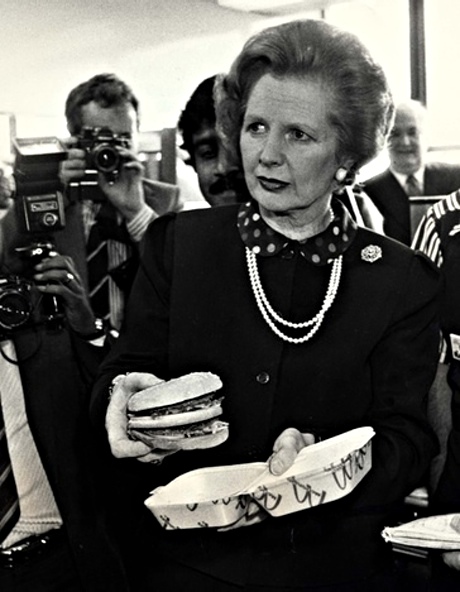The milk snatcher enjoying a big mac, McDonalds allowing the less well of that basic freedom in life -) to enjoy a meal out once in a while. Of course like many restaurant may not be healthy if eat in large quantities, nor would some of the food sold in Caledonian.
I missed an interested philosophical post.
“I am attracted to the idea that our politicians have been seduced by the market fundamentalist notion that the best outcomes for all are achieved by everyone acting in their own selfish interest. They can't say this openly because the idea is revolting to everyone except the people sitting on the desk of banks directly behind me, but it does explain a lot of their behaviour and instincts to de-regulate all commercial transactions including food purchases.”
I am quite cynical and although would not fully subscribe to "rational choice theory" or "Ayn Rands individualism " do tend to think that like business government for better or worse are ran for self-interest of those who run it by and large. So not quite sure how a “ non-capitalist" approach would be better therefore would have not consider the problem one of solely of capitalism.
If ministers MPs etc are not acting in own their own self-interest, are we to suppose they are acting against it, may be at times, for the greater good society, although I would tend to think sometimes this would involve a classification of the greater good to suite what happens to co inside with self interest. The classic self interest is when say elected officials vote for something they consider wrong or against that consider good, because this allows them to keep doing their "good work" which happens to align with keeping their job. I do tend a think a in the first instance best to apply a Rand type frame when evaluating a politician.
May also be some selection effect, pejoratively could be regarded as adverse as suggested by some that business leader politicians more likely to be sociopath or at least more responsive to incentives.
Although there may be some or even many ministers councillors who are there for the good of society, it cannot do any harm to consider through a self-interest frame in the same way if buying a used car may consider is this car really bad and salesperson misleading etc.
Tend to think businesses act predominately in self-interest but as do governments.
The housing problem is largely one created by governments rather than the product of "market fundamentalist" where transfer payments are in effect made from poorer to better off with state restriction of supply, state insurance and subsidy through interest rates. This has increased prices and rents part of the increases being a government created transfer payment in effect.
It is often a transfer from poorer to better off, also an intergenerational transfer from younger to older.
In a freer market housing would most likely be cheaper than it is now.
Although (it may be said , there is exceptions) people such as Milton Friedman may consider the government does more harm than good and unfettered markets always the way forward sometimes this is clearly not the case, things such as public goods parks libraries cycle lanes would be undersuppled if were left to the market.
The increase in the standards of living, from cheaper food, to electrical goods, to retail from likes of amazon and eBay, have not been through government action.
The things the government "control", housing, transport, education, have been getting more expensive. The governments have almost had a policy of inflating house price not allowing market corrections. Incidently although not suggesting because of, MPs who have been incentivised with a option on future value of London property through tax payer funded mortgages.
People may say communism did not work, look at the soviet union etc, however this was not done as well as could be done today the information units could be a lot better through technology.
In communist soviet union may be corruption, some more equal than others etc, possibly not the best example of the best possible communism. Likewise we have crony capitalism with some corruption and interest groups so may not be the best example of capitalism.
the pragmatic view expressed by Deng Xiaoping "the cat is black or white, as long as it catches mice" May be could have good or bad food under different systems.



 posts
posts
